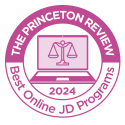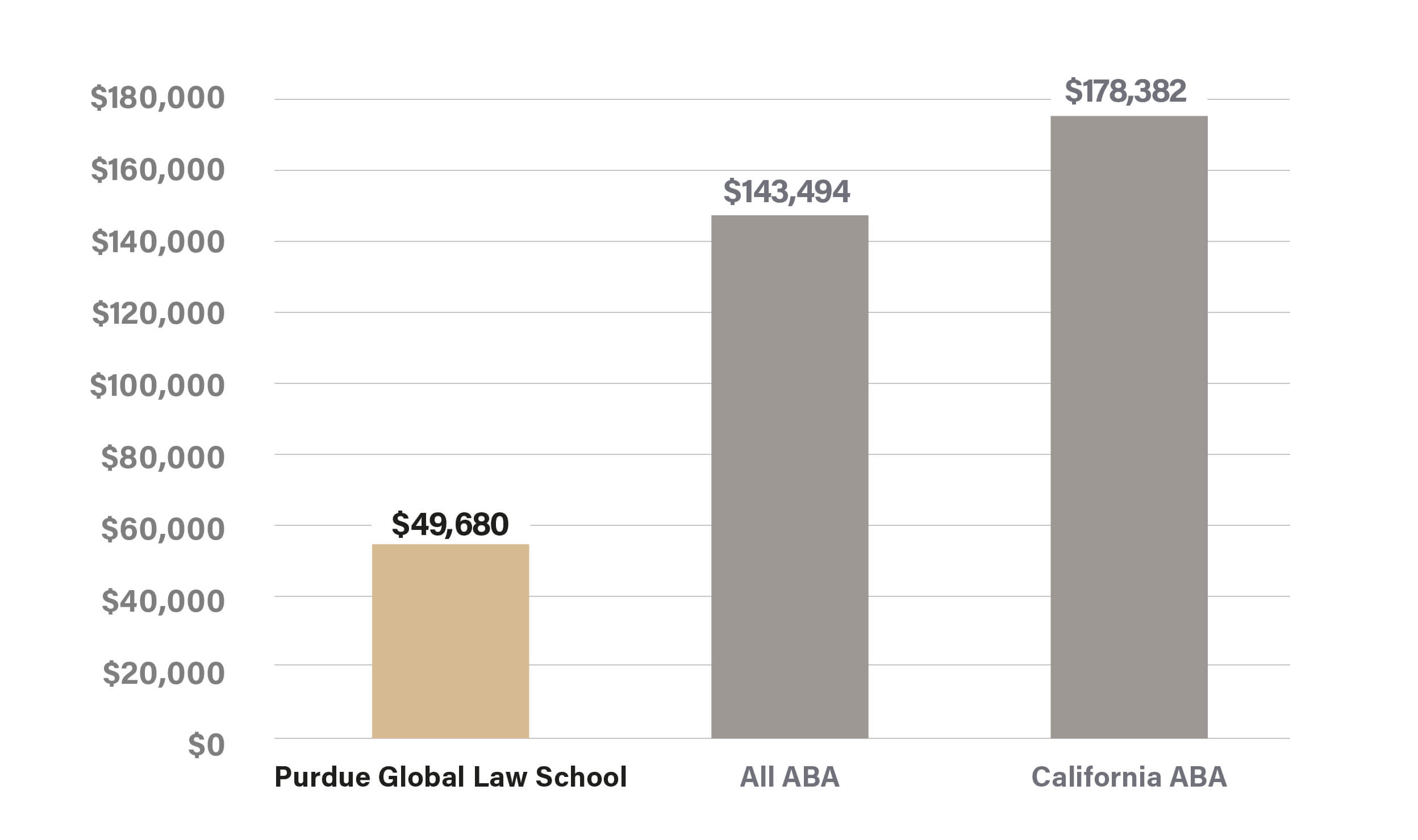Start Earning Your JD Degree Online
Purdue Global Law School is a state-accredited, 100% online law school in California. Our online Juris Doctor (JD) program can help you become a lawyer and prepares you to sit for the California Bar Exam, regardless of your location.
You will find a rigorous and convenient online law program that allows you to work if you need to and doesn’t require you to move to be near a traditional campus.
Why Choose Purdue Global Law School
Accredited by the Committee of Bar Examiners of the State Bar of California
No LSAT required
65% less average tuition than California ABA-accredited law schools
100% online since 1998
Innovative curriculum that includes national externships, competitive moot court program, postgraduate legal incubator program, and more
Experienced, supportive law faculty
More than 2,700 alumni
See Notes and Conditions section below for important information.

Purdue Global Law School was named to The Princeton Review's Best Online JD Programs list for the past four years (2021-2024).
An Affordable Online Law Degree
Enrolling in an online law school in California can be a more affordable option than traditional law schools. Purdue Global Law School's Juris Doctor tuition is 65% less average tuition than California ABA-accredited law schools.

Source: American Bar Association. Based on the published tuition rates of 193 ABA-approved programs. Calculation uses average tuition for a nonresident full-time student for a 3-year period. Purdue Global Law School's Juris Doctor is a part-time 4-year program, which equates to 3 years of full-time study.
Purdue Global Law School Accreditation in California
Due to Purdue Global Law School’s accreditation by the Committee of Bar Examiners, Purdue Global Law School has the authority to offer a Juris Doctor degree that qualifies recipients to take the California Bar Examination and obtain admission to the practice of law in California. With a California law license, you may be eligible to practice outside the state, depending on each state’s rules or the field you specialize in. Interested students should refer to Licensure.PurdueGlobal.edu for state-specific licensure requirements.
ABA Accreditation
The American Bar Association (ABA), the national accreditor for law schools, does not accredit fully online law schools due to its requirement that law schools be primarily campus based. California, however, is one of the few states to accredit law schools independently of the ABA.
Contact Purdue Global Law School
2029 Century Park East, Suite 400, Los Angeles, California 90067
Phone: 877-757-8189
Become a Lawyer in California with an Online Law Degree
If you are interested in becoming a lawyer by attending a California online law program, there are several things to consider, including the steps to becoming a California-licensed attorney and state accreditation and bar requirements. Learn more about how to become a lawyer in California.
Apply Online and Enroll
Complete your bachelor’s degree.
Enroll to earn your Juris Doctor at Purdue Global Law School.
Complete Your JD Program
Register as a law student with the California State Bar.
Graduate with a JD from Purdue Global Law School.
Prepare for the Bar
Undergo a background check and receive a Positive Moral Character Determination.
Take and pass the Multistate Professional Responsibility Exam.
Take and pass the California Bar Exam.
Purdue Global Law School Success Stories
[Purdue Global Law School] has prepared me to be able to do this work because they teach you the background and criminal law. They teach you how to do the legal research. They teach you how to do the citations. They teach you how to write papers. So, they really kind of prepare you for not only the bar exam, but the reality of what's out there in the legal profession.
See Notes and Conditions section below for important information.
FAQs About Law Schools in California
The American Bar Association (ABA) will not accredit fully online law schools due to the ABA’s limits on distance learning. However, the Committee of Bar Examiners of the State Bar of California accredits law schools independently of the ABA. California’s accreditation rules do permit accreditation of fully online law schools. Purdue Global Law School is accredited by the Committee of Bar Examiners of the State Bar of California, and its Juris Doctor graduates are eligible to sit for the California Bar Exam upon graduation.
A traditional, in-person Juris Doctor (JD) program takes 3 years to complete for a full-time student and 4 years to complete as a part-time student. At Purdue Global Law School, the part-time JD program typically takes 4 years to complete.
Purdue Global Law School has its own online admissions exam and does not require applicants to take the LSAT (unless they were previously academically dismissed from a law school). Most campus-based ABA law schools require the LSAT, although in recent years, some traditional schools have begun to accept the Graduate Record Examination (GRE) as well.
Learn more about the requirements to get into law school.
There are four basic requirements to become a lawyer in California:
Complete your JD degree at a law school approved by the ABA or State Bar of California.
Pass the Multistate Professional Responsibility Examination (MPRE)
Pass the California Bar Exam
Pass California’s moral character and fitness screening.
As of 2022, California has the highest number of lawyers in the United States. That figure is projected to grow by 8.1% by the year 2028, producing an annual average of 6,150 job openings.
See Notes and Conditions section below for important information.
About 71% of lawyers in California work in the private sector. Among those working in the private sector, most work for a law firm, and others work as solo practitioners or as in-house counsel. For those working at a law firm, about 63% work at a relatively small firm (between 2 and 50 attorneys), and 26% work at very large firms (200+ attorneys).
Thirteen percent of California lawyers work in government, with the highest number working for county governments. There are also paths in federal and state government as well as city government and other roles. This breakdown between public and private lawyers in California is similar to the difference at the national level.
See Notes and Conditions section below for important information.
In-person administration of the California Bar Exam resumed in February 2022. California is exploring possible modifications to the bar exam, and it is possible that an online option may become available in the future.
There are a number of specializations for lawyers to pursue in California. The California State Bar Board of Legal Specializations certifies lawyers in the following areas of specialization:
Admiralty and maritime law
Appellate law
Bankruptcy law
Criminal law
Estate planning, trust, and probate law
Family law
Franchise and distribution law
Immigration and nationality law
Legal malpractice law
Taxation law
Workers' compensation law
Lawyers may also choose to pursue specialization from a California Board of Legal Specialization certified organization. These organizations certify lawyers in the following areas:
See Notes and Conditions section below for important information.
See Notes and Conditions section below for important information.


